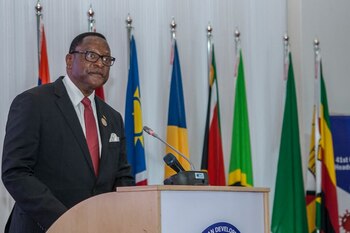
Malawi President Lazarus Chakwera says he will take steps to mitigate the steep rise of fertilizer prices which have doubled in the last year. He says about 80 percent of Malawi farmers can no longer afford to buy fertilizer.
Farmers in Malawi say the rise in fertilizer prices is likely to affect production in this agro-based southern Africa country.
Jacob Nyirongo is Chief Executive Officer for Farmers Union of Malawi.
“Most farmers in Malawi are poor and it’s quite a struggle for farmers to access fertilizer even at the prices that they were like last year. So, the increase that we have seen this year means it is pushing more farmers to a bracket where most farmers won’t be able to access fertilizer," he said.
Fertilizer prices have hit an all-time high in Malawi with a bag weighing 50 kilogram now selling between $40 and $50 dollars. This is almost double the prices of last year.
Agriculture experts say this would likely lead to higher costs for government subsidized fertilizers under the Affordable Inputs Program, in which ultra-poor farmers buy at $6 dollars per 50 kilograms bag.
But in his national televised address Saturday, President Chakwera vowed the keep the prices low.
He said the price hike is the result of actions by a cartel, which he did not name, and accused it of trying to undermine his Affordable Inputs Program.
He says “But what I want you to know is that I and my government cannot allow someone to kill agriculture in this country. Whether one likes it or not, farmers will buy fertilizer at a cheaper price this year.”
He, however, said the prices might be slightly higher than last year’s but not as exorbitant as they are now.
But the Fertilizer Importers Association in Malawi, a group of fertilizer importers justifies the current price rise.
Speaking in Malawi Parliament Wednesday, the group said the rise is dictated by the international market which is facing the rise in fertilizer’s raw materials like phosphate.
In response to the rise in fertilizer prices, the Ministry of Agriculture announced in July that it has trimmed the number of beneficiaries of the subsidized farm input program this year from 3.7 million to 2.7 million.
But Chakwera has reversed that decision.
“I will not allow anyone to remove any family or village from the list of beneficiaries of the cheap fertilizer. This is taking the government for granted. If there are people I vowed to fight for, they are the farmers,” he said.
Dr. Betchani Tchereni is a lecturer in Economics at Malawi University of Business and Applied Sciences.
He says farmers should do organic farming which largely relies on manure.
“This organic way of farming is the way to go. We just need to propagate it to make sure that everyone understands the best way of doing it. Once we do that, I think issues of biodiversity will come in and I am very sure that at the end of the day, we are going to benefit as a country economically and also in terms of our own health,” he said.
But Farmers Union’s Nyirongo, also an agronomist, says manure cannot stand alone.
“So what we have seen as farmers is that if you use manure, you improve the health of the soil. And you enable the soil to utilize the fertilizer that you apply to a crop. So, if for example, you combine manure with inorganic fertilizer, you get the best yield,” he said.
Nyirongo says for now, farmers are keeping their fingers crossed on President Chakwera’s pledge to help control the overpricing of fertilizer.
Últimas Noticias
Debanhi Escobar: they secured the motel where she was found lifeless in a cistern
Members of the Specialized Prosecutor's Office in Nuevo León secured the Nueva Castilla Motel as part of the investigations into the case

The oldest person in the world died at the age of 119
Kane Tanaka lived in Japan. She was born six months earlier than George Orwell, the same year that the Wright brothers first flew, and Marie Curie became the first woman to win a Nobel Prize

Macabre find in CDMX: they left a body bagged and tied in a taxi
The body was left in the back seats of the car. It was covered with black bags and tied with industrial tape
The eagles of America will face Manchester City in a duel of legends. Here are the details
The top Mexican football champion will play a match with Pep Guardiola's squad in the Lone Star Cup

Why is it good to bring dogs out to know the world when they are puppies
A so-called protection against the spread of diseases threatens the integral development of dogs




